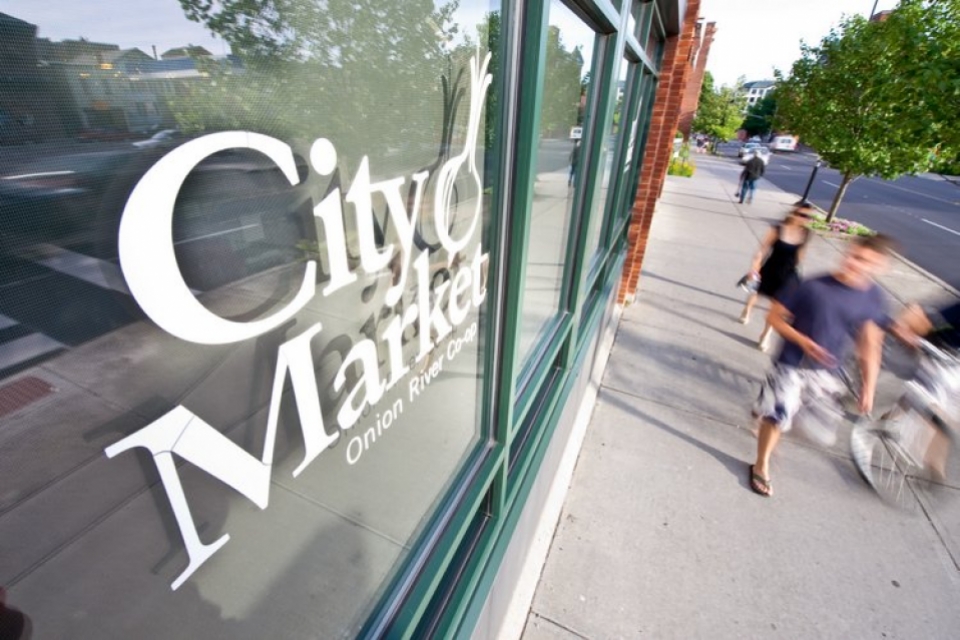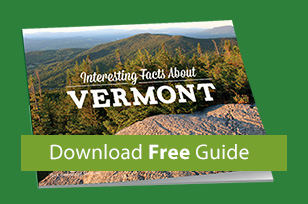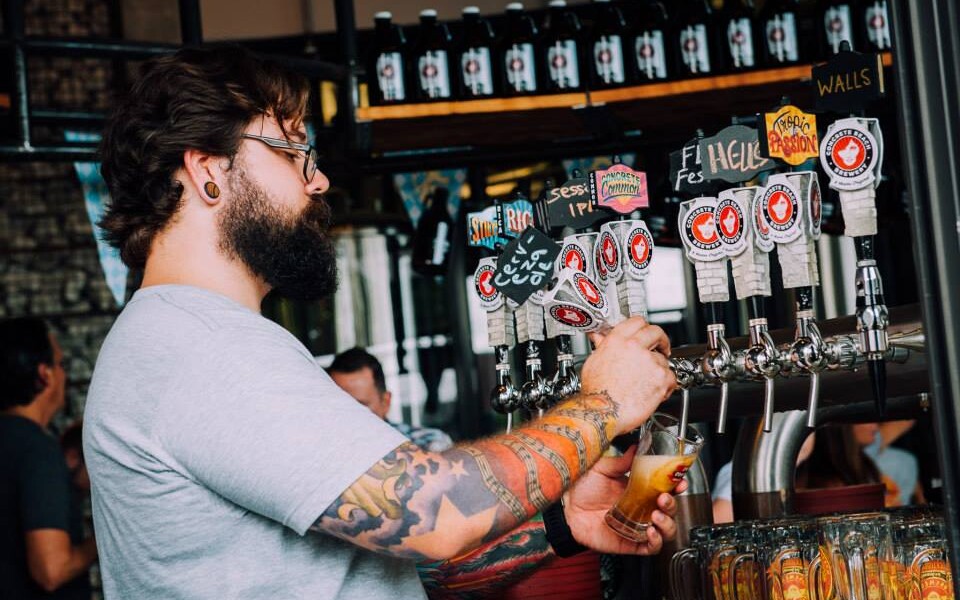By John Turner
Several sustainability leaders in Vermont are taking steps to make a difference locally and across the world. One of those leaders is Pat Burns, general manager of City Market, Onion River Co-op, a community-owned food cooperative located in downtown Burlington.
The co-op is dedicated to supporting the local economy and strengthening the Vermont food system, and working with thousands of Vermont vendors to feature a wide selection of local and Vermont-made products. We asked Pat about City Market’s commitment to sustainability and the community.
What is a co-op and what does it mean for you and our community?

Cooperatives are member-owned businesses that operate for the benefit of their members according to a set of agreed upon principles. City Market has more than 10,000 members, who by joining, have pooled their resources and essentially put equity into the business to help it grow. We are one of about 140 co-ops who are members of the National Cooperative Grocers Association (NCGA), with one of the main benefits being they negotiate with the largest suppliers of natural foods, which in turn improves our purchasing power.
Anyone who joins our co-op has the same rights and privileges because we are all equal. One person, one vote. While we are not a nonprofit, we are a for-profit store, but as a co-op we don’t make money off the purchases of our members. Members get a rebate based on how well we do and their purchases. We have been doing it for five-and-a-half years and we have sent $2.7 million back to the community.
What else do you do that is different to a regular store?
Another way we are different is that we have a member worker program. Any member can apply to become a member worker, and depending on how many hours you work here you’ll receive a discount on your groceries.
We also have a program where we work with numerous nonprofits in town, organizations that have a common purpose with ourselves. If you volunteer at one of these organizations, aside from helping that nonprofit, you’ll also get credit for your hours here at City Market with discounted groceries. We want to support and help serve the community and thought this program was a great way to do it. Last year we had over 800 hours of volunteer work that went to these nonprofits that then counted as discounts on their groceries.
City Market has 215 employees so we are a pretty good size business and care about our employees. We provide a path to a livable wage as about 75 percent of our employees are full time, which is unusual for a typical grocery store who usually have only 20-25 percent full time. We pay 100 percent of their health insurance, they get four weeks of time off, 15 percent off of their groceries, and we do a matching 401K up to 6 percent. We work hard to be a employment destination of choice.
How do you support Vermont businesses?
Last year more than one third of our $36 million of sales were products considered local. On a weekly basis around 270 local vendors supply their products to our store. We do everything we can to encourage local suppliers; for example in the summer local products represent about 75-80 percent of our produce department sales. It is a part of what makes us different and feel it gives us a tremendous competitive advantage.
Speaking of competitive advantages what challenges are you facing?
Any grocery store is in competition if you ask the question “where do you shop, and why you shop there.” The top answer for most people is convenience. While at this location we have both parking and convenience, it is hard for us to compete with national chains in terms of their buying power and their pricing. We stock all of the basic necessities, milk, butter, eggs, cereal, peanut butter, those kinds of things that we can price at a very competitive point and that helps us, so that when someone comes and they don’t want organic they can find conventional items as well.
The other side of the coin though is that other grocery stores are becoming more aware of the demand for organic products and are starting to enlarge those sections in their stores. The situation remains that as we get more grocery stores here but the population is not increasing, we have to work harder for our customers.
What sustainable food systems have you put into place?
There’s a number of initiatives we’re proud of including generating some of our power needs with solar panels on the roof, and we’ve just finished a large installation of LED lights to replace the regular lighting. We already have some bike parking and are planning to add to that to further encourage people to ride their bikes here.
We have done a lot of work on how we separate compost from recycling and the garbage. Before we instituted the program it was probably 60 percent of waste product went to garbage and 40 percent went to recycling, and now only 25 percent goes to garbage and the rest is split up between compost and recycling. We’ve also added composting bins in the cafe and are constantly looking for ways to do inform our customers and enable them to help our efforts.
Another example is we installed a reverse osmosis water machine, which is free for members to fill their bottles, which takes plastic bottles out of the waste stream. Each one of those initiatives ties into a different aspect of sustainability, and means we create less waste which helps the environment while saving us money. It makes good business sense to do the right thing.
How do you find new sustainable opportunities, where do you look for inspiration?
One of the best ways we are able to stay abreast of new ideas is via our partnerships with other co-ops and membership of NCNG. We are constantly sharing ideas and results with them to better utilize our store, reduce costs and improve our customers’ experience.
In addition, through our business plan we’re constantly looking at 3 different challenges.
1. How do we expand and continue to support the local economy.
2. Preparing for our second store to open.
3. Changing people’s perceptions.
We are working with vendors in a few different ways. In the spring our produce department buyers go out and meet with every farmer and ask what they are planting for the year, what is your timetable, and how much are you planning to produce? Their answers help us plan and also guarantee how much we will buy from them. We will commit to orders ahead of time, as this helps our suppliers as well as guaranteeing the supply of certain items for ourselves.
Another innovation we’ve started is by providing interest free loans to farms, we’re able to source products that we might not necessarily have or to ensure that we have enough supply to meet the demand.
How do you determine what products you stock?
Through our affiliation with NCGA we have access to national sales data, so we analyze every category and find out what the top selling products are within the United States. In addition we constantly review customer comment cards for suggestions and attend organic and natural food trade shows. Between all of those we get a pretty thorough idea of what customers are demanding and what new products are available.
Of the products consumers are demanding, are there clear patterns?
Local is leading the list closely followed by organic. There are a lot of specialty items like very specific gluten free, macrobiotic, no GMO’s, etc., that people are asking for and have expectations that we will carry. While we try and accommodate all requests, we are constrained at this store as we only have 12,000 square feet, which is considerably less than most of our competitors.
Do you have a report on your sustainability?
We don’t produce a stand-alone report, however we have our annual report which contains both a sustainability, environmental and community section. I also compile a report for the board that contains information about our initiatives and plans, and demonstrates how we support sustainability and the environment. We don’t “green wash” because we live this every day. We just do it. It’s fun and it’s a challenge, and we’re looking forward to our next store down on Pine Street.
John M. Turner is a communications professional for the University of Vermont School of Business Administration, which recently launched the Sustainable Entrepreneurship MBA (SEMBA) program.





